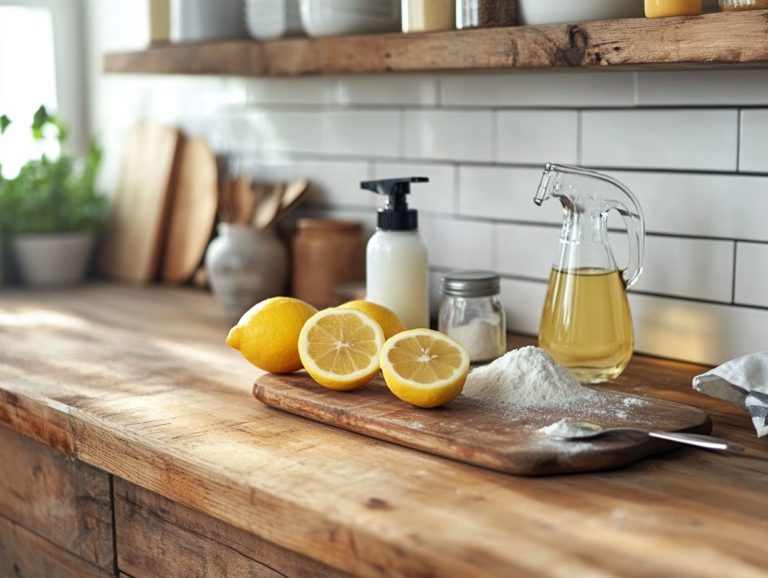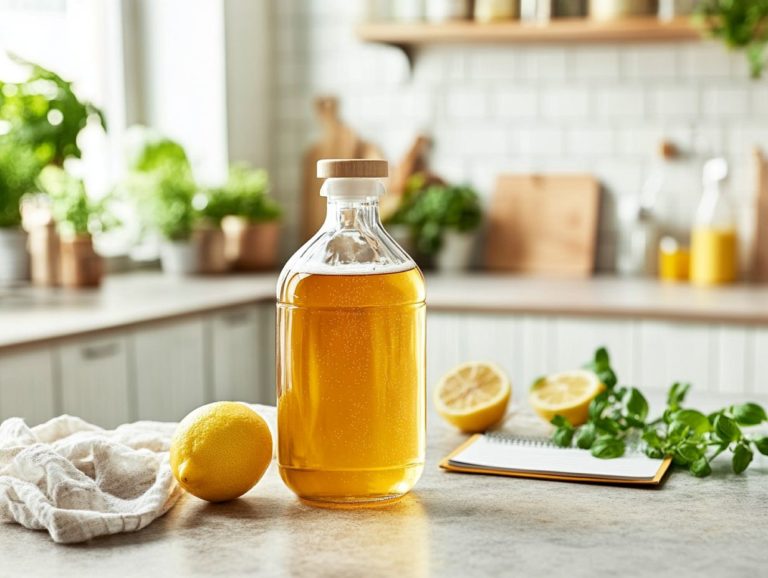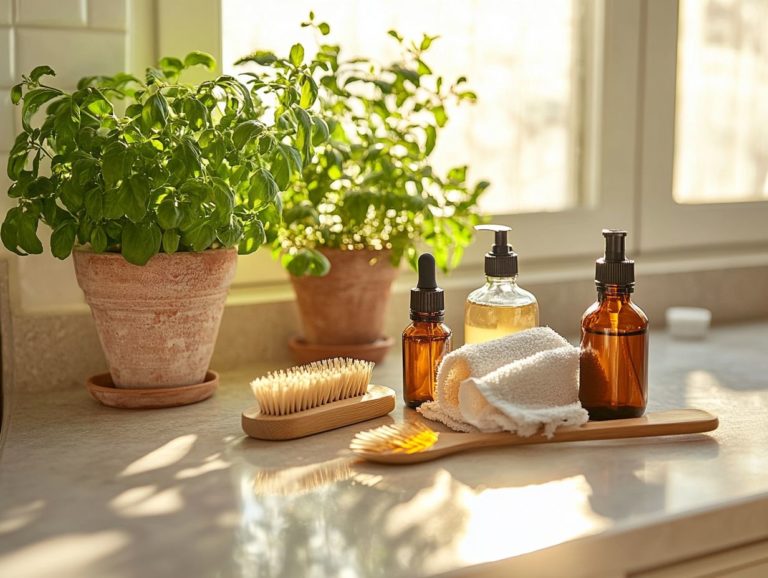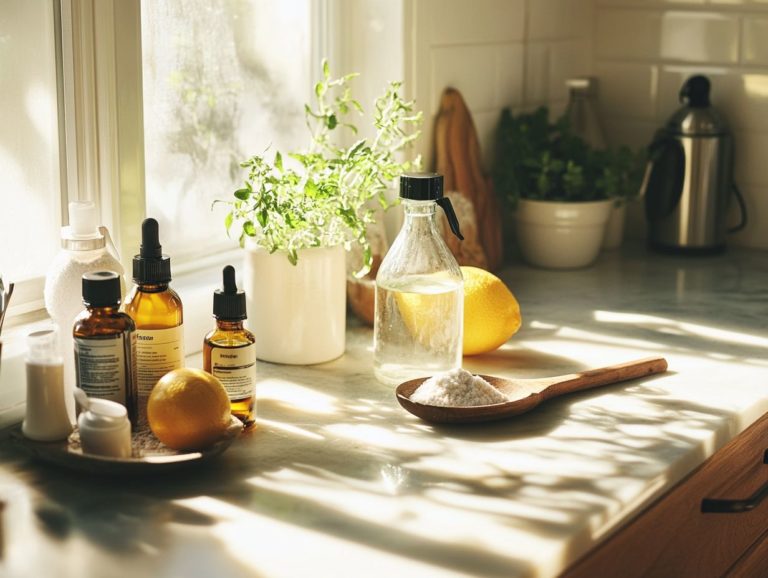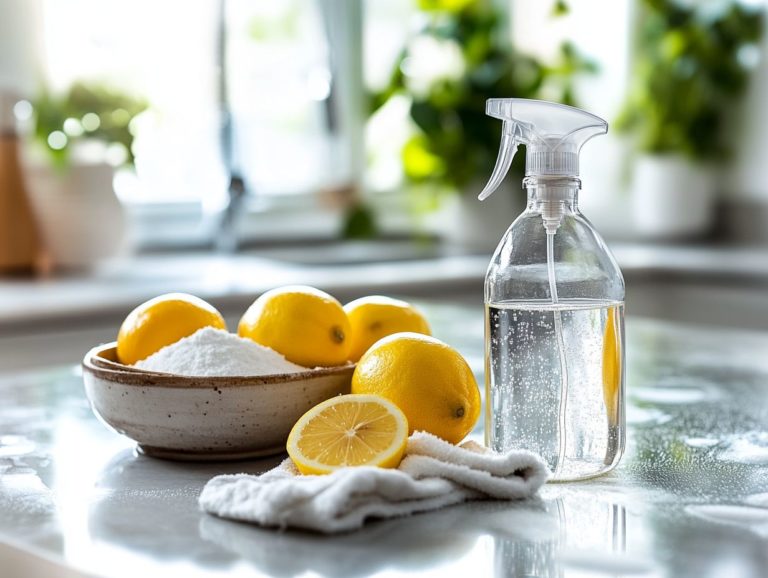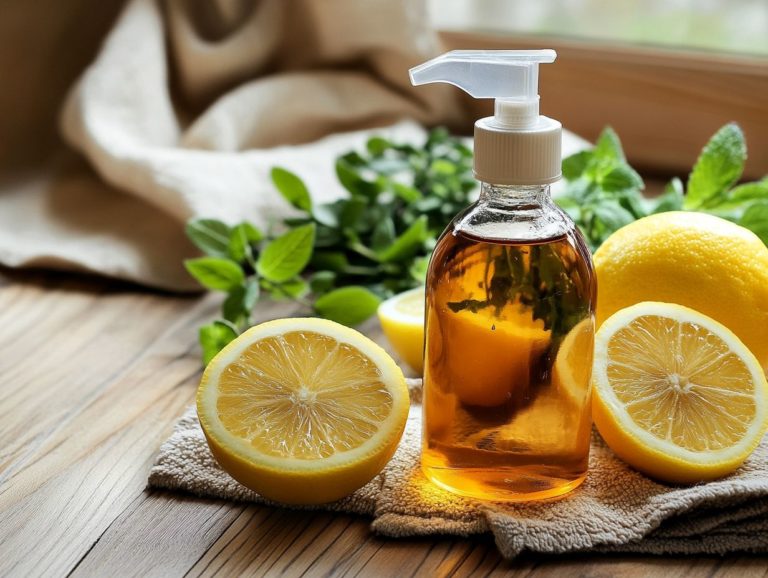5 Best Practices for Making Homemade Cleaners
Are you considering crafting your own homemade cleaning sprays?
This guide offers five essential best practices for creating effective, eco-friendly homemade cleaning sprays. It covers everything from selecting natural household ingredients like dish soap and hydrogen peroxide to mastering proper mixing methods, ensuring that you achieve impressive results while prioritizing safety.
Explore the numerous advantages of DIY cleaners, get familiar with common household ingredients to incorporate, and discover specific recipes designed for a range of cleaning tasks. Act now to transform your home into a sparkling sanctuary with effective homemade cleaning solutions!
Contents
- Key Takeaways:
- 1. Use Natural Ingredients
- 2. Follow Proper Mixing Guidelines
- 3. Test on a Small Area First
- 4. Label and Store Properly
- 5. Use Protective Gear When Necessary
- What Are the Benefits of Making Homemade Cleaners?
- What Are Some Common Ingredients Used in Homemade Cleaners?
- How Can One Ensure the Effectiveness of Homemade Cleaners?
- What Are Some Homemade Cleaner Recipes for Specific Cleaning Needs?
- How Can One Save Money by Making Homemade Cleaners?
- What Are Some Safety Precautions to Keep in Mind When Making Homemade Cleaners?
- Frequently Asked Questions
- What are the 5 best practices for making homemade cleaners?
- Why is it important to use natural ingredients when making homemade cleaners?
- Should I follow a specific recipe when making a homemade cleaner?
- What is the best way to store homemade cleaners?
- Why is it important to label homemade cleaners?
- What safety precautions should I take when making homemade cleaners?
Key Takeaways:
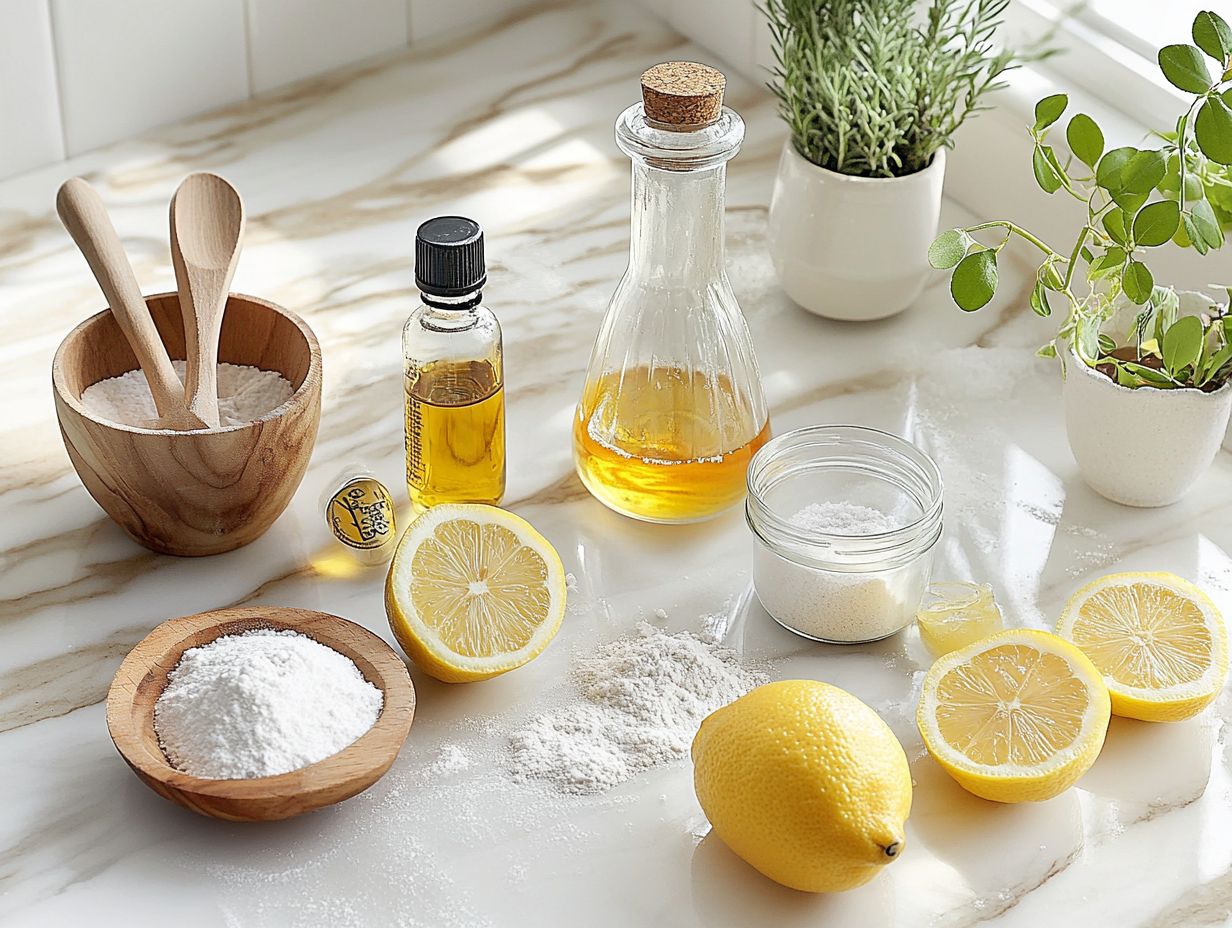
1. Use Natural Ingredients
Using natural ingredients in your cleaning solutions creates a healthier home environment and reduces your exposure to harsh chemicals often found in commercial products. Think of staples like white vinegar, baking soda, and essential oils such as lemon and rosemary they re not just for cooking!
These eco-friendly ingredients effectively handle stains and spills. By combining them, you can whip up versatile, homemade cleaning sprays that serve multiple purposes, including all-purpose cleaners, air fresheners, and specialized solutions for glass and natural stone surfaces.
Incorporating ingredients like lemon rind and rosemary sprigs enhances the effectiveness and scent of your cleaning recipes. By choosing these natural alternatives, you can enjoy benefits such as reduced allergens, a lower environmental impact, and significant cost savings.
For instance, crafting a simple all-purpose cleaner is as easy as mixing equal parts of white vinegar and water, adding a few drops of lemon essential oil for an extra antibacterial boost and a delightful scent.
To amplify the cleaning power of baking soda, use it as a scrubbing agent alongside vinegar to tackle tough stains in your kitchen or bathroom. Always label your homemade cleaners clearly, store them out of reach of children, and conduct a patch test on surfaces before extensive use. Adding a few drops of essential oils like tea tree or eucalyptus can also boost the antibacterial properties of your solution.
This approach keeps your home sparkling clean and supports a healthier, more sustainable lifestyle!
2. Follow Proper Mixing Guidelines
When crafting your own cleaning sprays, proper mixing is key to ensuring both effectiveness and safety, especially when handling strong ingredients like rubbing alcohol or essential oils. Correctly mixing these substances helps you fight grease and fingerprints without damaging surfaces or risking your health.
For optimal results, consider using microfiber cloths to apply your solutions and polish surfaces. For example, a common mixing ratio for rubbing alcohol is one part alcohol to three parts water, which results in a potent disinfectant spray. Essential oils, while fantastic for their antibacterial properties, require a more cautious approach; a good mix might consist of five drops of essential oil per cup of water.
Household staples like vinegar and baking soda are excellent natural alternatives for cleaning. When using vinegar, it s often best to mix it in a ratio of one part vinegar to one part water for cleaning countertops and appliances. Adding a small amount of dish soap can enhance the cleaning power of this homemade cleaner.
Always remember to mix these solutions in a well-ventilated area, and consider donning gloves to protect your skin from potential irritation. Labeling your homemade cleaners clearly is essential to prevent any accidental misuse. Using childproof containers and storing them properly further enhances safety.
3. Test on a Small Area First
Before you apply any homemade cleaner to a large surface, it s essential to test your solution on a small, inconspicuous area. This simple step ensures you don t accidentally damage the material or leave behind any unwanted residue. This is especially crucial when working with delicate surfaces like natural stone, where improper cleaning can result in permanent stains or scratches.
Carolyn Fort from the Good Housekeeping Institute often recommends this method to avoid costly mistakes. Regarding natural stone, you ll want to tread carefully, but don t overlook hardwood floors and marble countertops. These materials are particularly vulnerable to harsh chemicals and abrasive cleaning agents.
For example, using the wrong cleaner on hardwood can warp the wood or leave unsightly dull patches, while poor cleaning methods on marble might etch the finish and dull its shine. To minimize the risk of damage, take a moment to conduct a small test with different homemade cleaner recipes on a hidden spot.
Not only will this help you determine the compatibility of the cleaner, but it will also showcase its effectiveness in tackling stubborn stains without causing harm.
4. Label and Store Properly
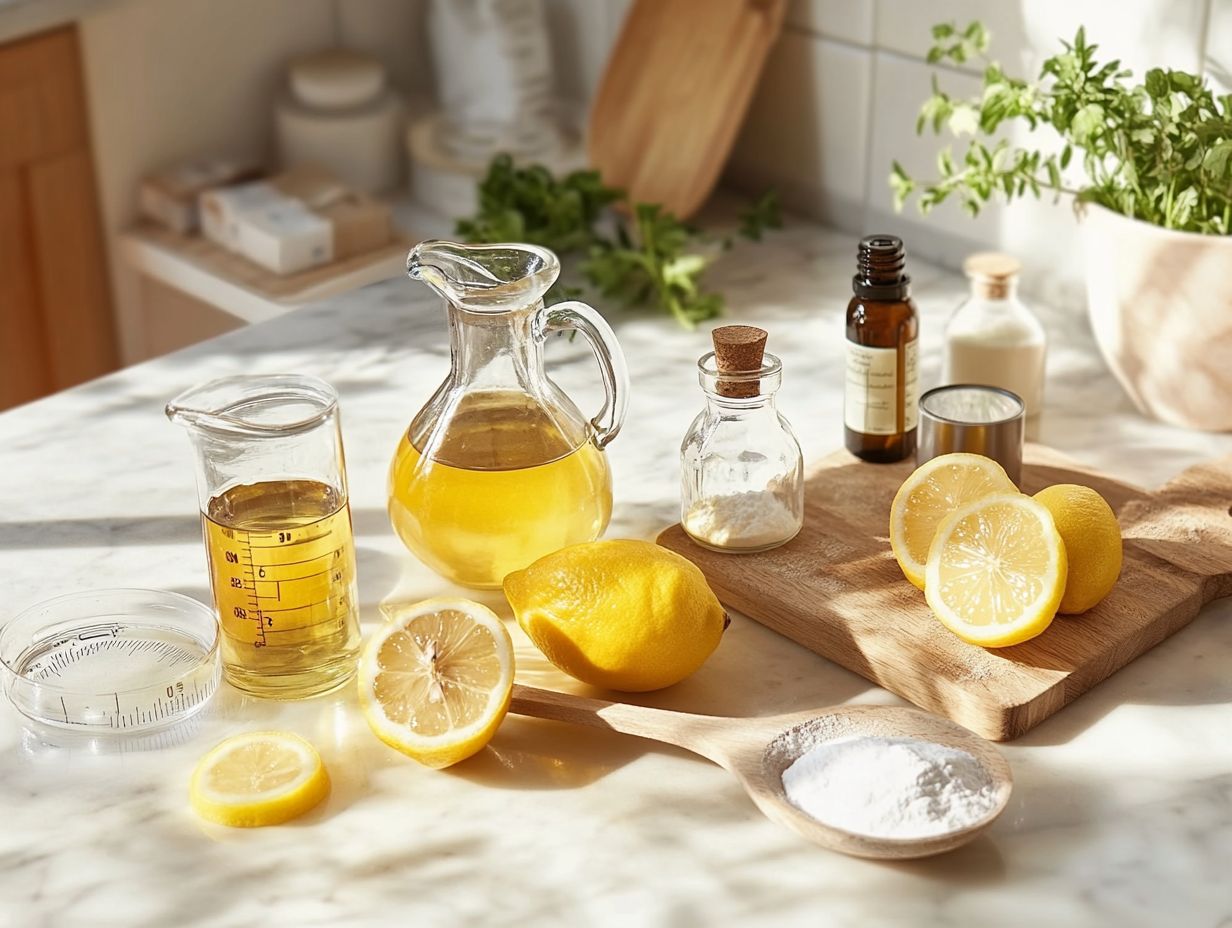
Properly labeling and storing your homemade cleaning sprays is a crucial step for ensuring both safety and efficiency, especially when you have a variety of DIY cleaners in your arsenal. Clear labels are essential for identifying the contents and their appropriate usage, while safe storage practices help prevent accidental misuse or contamination particularly when dealing with potent agents like rubbing alcohol or vinegar that can be hazardous if ingested or mishandled.
Lauren, a senior editor at Good Housekeeping, emphasizes the importance of proper storage for the safety and longevity of cleaning products. When crafting your labels, make sure to include vital information such as the product’s name, key ingredients, and intended use to eliminate any potential confusion.
It s also wise to add a cautionary note regarding children and pets, stressing that these products should be kept out of their reach. For optimal safety, store your homemade cleaning products in a cool, dark place, away from direct sunlight and heat sources that could compromise their effectiveness.
Consider using childproof containers to further reduce any risks, ensuring that your cleaning solutions remain both practical and secure within your home environment. Alyssa Gautieri from Good Housekeeping recommends this method as one of the best safety tips for homemade cleaners.
5. Use Protective Gear When Necessary
When working with certain homemade cleaning solutions, especially those rich in strong acids or solvents like rubbing alcohol and vinegar, using protective gear such as gloves, masks, and goggles is not just advisable; it s essential.
By taking these precautions, you protect your skin, respiratory system, and eyes from potential irritation or injury, paving the way for a safe and effective cleaning experience. The protective gear you choose may vary based on the cleaning task at hand.
For powerful ingredients like bleach, you should opt for nitrile gloves that provide superior resistance to harsh chemicals. A mask equipped with a charcoal filter can significantly cut down on inhaling harmful fumes, enhancing your overall safety.
Keep in mind that even seemingly innocuous items, like baking soda, can produce dust that may irritate your respiratory system when inhaled. Therefore, ensuring proper ventilation while using any DIY cleaners is equally vital.
Don’t wait! Protect yourself right now with gloves and goggles! Remember to close containers when they re not in use to minimize exposure to potentially harmful vapors. All these measures work together to create a safer and more efficient cleaning process.
Try these tips today to make your cleaning safer and more effective!
What Are the Benefits of Making Homemade Cleaners?
Creating your own cleaners can save you money. You also get to choose natural ingredients tailored to your specific cleaning needs.
By opting for DIY cleaners, you gain control over what goes into your products. This minimizes exposure to harmful chemicals and fosters a safer environment for your family.
These homemade alternatives play a significant role in promoting a healthier home. Many store-bought cleaners contain toxins that can irritate your skin or trigger respiratory issues. DIY options often feature simple, safe components like vinegar, baking soda, and essential oils. Choosing DIY cleaners means you can breathe easy knowing your home is safe!
Your choices also positively impact the environment. Using natural materials reduces chemical runoff that can harm ecosystems. Customizing these cleaners to tackle specific tasks whether it s banishing stubborn stains or neutralizing odors enables you to maintain a spotless home without compromising your health or the well-being of the planet.
What Are Some Common Ingredients Used in Homemade Cleaners?
- White vinegar – natural cleaning agent
- Baking soda – gentle abrasive
- Essential oils – add pleasant scents
- Lemon juice – cuts through grease
- Castile soap – powerful degreaser
Common ingredients in homemade cleaners feature versatile staples, each contributing unique properties to enhance your cleaning efforts. For example, white vinegar serves as a natural cleaning agent that kills germs, while baking soda acts as a gentle abrasive, allowing you to scrub surfaces without scratching. Adding a bit of dish soap can cut through tough grease and grime.
Lemon juice is a celebrated hero in the cleaning world, known for its ability to cut through grease while leaving behind a fresh scent making it an ideal addition to your kitchen cleaners. Castile soap, with its natural lipid composition, stands out as a powerful degreaser, perfect for tackling sticky residues. For an added touch, consider using Kool-Aid or TANG to add a pleasant aroma and extra cleaning power to your homemade solutions.
When you combine white vinegar and baking soda, you’ll create a delightful fizzing reaction that efficiently tackles clogged drains. A simple yet effective recipe you might enjoy involves mixing equal parts vinegar and water, along with a few drops of your favorite essential oil. This concoction results in a refreshing all-purpose cleaner, perfect for keeping your countertops and bathrooms sparkling clean.
How Can One Ensure the Effectiveness of Homemade Cleaners?
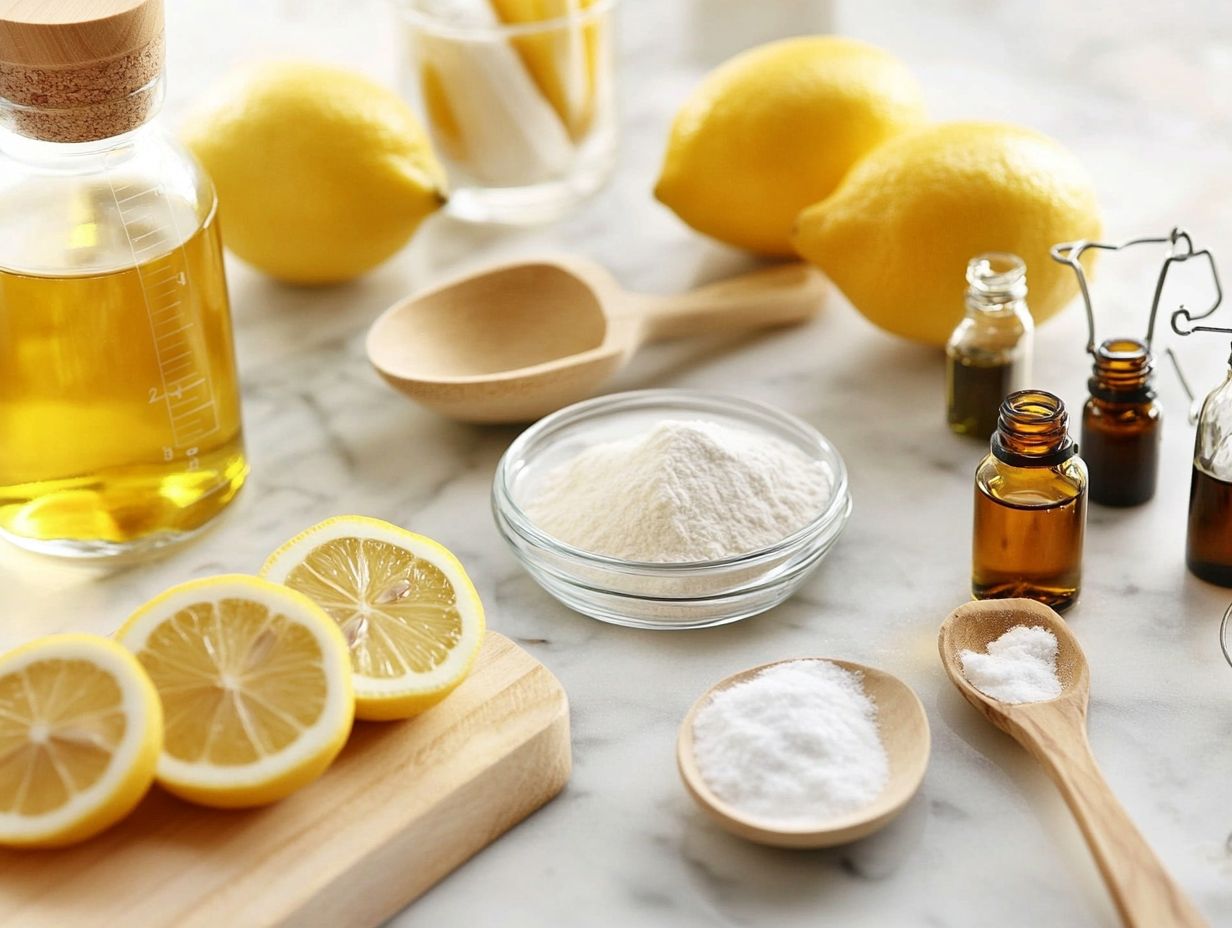
To ensure the effectiveness of your homemade cleaners, it s crucial to follow specific guidelines. This includes exact amounts, the right mix of ingredients, and thorough testing on various surfaces.
One effective strategy is to focus on proper dilution techniques, as using overly concentrated solutions can lead to residue buildup or ineffective cleaning. Selecting the right tools, such as microfiber cloths, significantly enhances your cleaning process, as they trap dirt and dust more efficiently than traditional rags.
It s also wise to test any new cleaner on an inconspicuous area before applying it more broadly, ensuring compatibility with the surface. If you encounter clogs or streaking, simply adjusting the ratios of water to cleaning agents can often resolve these issues, resulting in a cleaner and more polished finish.
What Are Some Homemade Cleaner Recipes for Specific Cleaning Needs?
You can easily tailor homemade cleaner recipes to meet your specific needs. They offer effective alternatives to commercial products.
For example, a simple all-purpose cleaner can be crafted using white vinegar, water, and your choice of essential oils. If you re looking to achieve a streak-free shine on your windows, a glass cleaner made from vinegar and rubbing alcohol will do the trick.
These DIY solutions create a healthier home and save you money. Feel free to customize the scent of your all-purpose cleaner by selecting different essential oils perhaps lemon for a refreshing aroma or tea tree oil for its antibacterial benefits.
When you apply these cleaners, it s crucial to use microfiber cloths. They provide optimal absorption while ensuring that you avoid scratching surfaces, particularly when tackling those windows.
For natural stone surfaces, a gentle soap and water solution works wonders, keeping them looking pristine without causing any damage. Each recipe comes with its own special tips to ensure maximum effectiveness for whatever cleaning task you have at hand.
How Can One Save Money by Making Homemade Cleaners?
Making your own cleaners is a smart way to save money while keeping your home clean and healthy. You ll find that many effective cleaning solutions can be whipped up using inexpensive household ingredients.
By utilizing the strength of baking soda, vinegar, and dish soap, you can dramatically cut down on spending for commercial cleaning products without sacrificing cleanliness. In fact, the average cost of store-bought cleaners can add up quickly, often exceeding $20 per month for a full set of effective products.
On the flip side, crafting your own cleaners can cost you as little as $5 to $10 monthly, freeing up your finances for other priorities. By consistently opting for homemade cleaners, you may discover significant long-term savings.
Let s not forget that many commercial brands come in single-use plastic packaging, contributing to environmental waste. Embracing homemade solutions not only supports a budget-friendly lifestyle but also nurtures a more sustainable cleaning routine, reducing your reliance on chemicals and plastics that are harmful to the planet.
What Are Some Safety Precautions to Keep in Mind When Making Homemade Cleaners?
When crafting your own homemade cleaners, it s crucial to adhere to safety precautions to protect yourself and ensure that your cleaning products work effectively.
This means wearing protective gear when handling strong ingredients. Store your cleaners safely to avoid accidental ingestion, and keep a vigilant eye on the reactions between mixed substances.
Beyond simply wearing gloves and masks, take the time to familiarize yourself with the unique properties of each ingredient in your cleaning solutions. Understanding how these ingredients can interact will significantly reduce any safety risks during the mixing process.
It’s wise to work in a well-ventilated area and keep all materials out of reach of children. Teach your family about the potential hazards of these products, especially for younger ones.
By educating them not to ingest any cleaning solutions and ensuring they know where these products are stored, you can foster a safer home environment. Regular conversations about safety protocols not only cultivate awareness but also instill a sense of responsibility.
Frequently Asked Questions
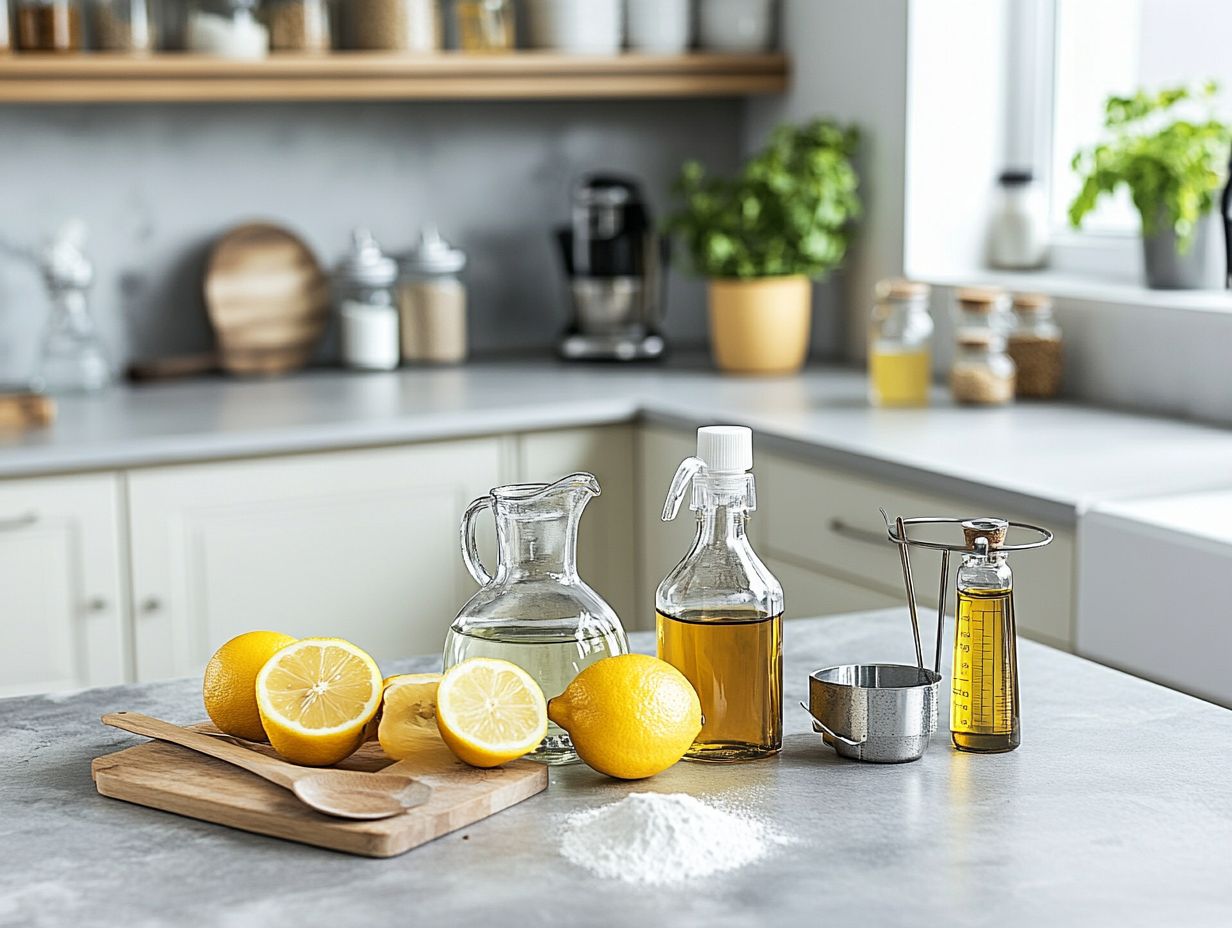
What are the 5 best practices for making homemade cleaners?
The 5 best practices for making homemade cleaners are using natural ingredients, following a recipe, properly storing the cleaner, labeling the cleaner, and using proper safety precautions.
Why is it important to use natural ingredients when making homemade cleaners?
Using natural ingredients ensures that the cleaner is safe for both you and the environment. It also reduces the risk of exposure to harmful chemicals.
Should I follow a specific recipe when making a homemade cleaner?
Yes, it is important to follow a specific recipe when making a homemade cleaner to ensure that the proportions of ingredients are correct and the cleaner is effective.
What is the best way to store homemade cleaners?
Want your homemade cleaners to work their best? Store them in airtight containers in a cool, dry spot!
Why is it important to label homemade cleaners?
Labeling homemade cleaners helps you remember the ingredients and instructions. It also alerts others about any risks and prevents mix-ups with other products.
What safety precautions should I take when making homemade cleaners?
When making homemade cleaners, wear gloves and eye protection. Work in a well-ventilated area, and always keep these cleaners out of reach of children and pets.

